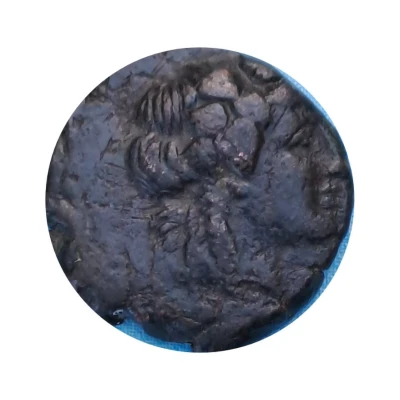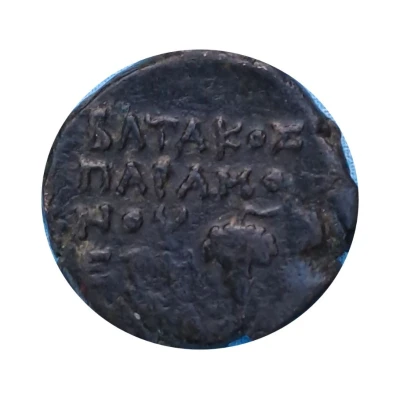


© jorandmichel (CC0)
Bronze AE 15 250 BC - 200 BC
| Bronze | 2.85 g | 15.7 mm |
| Issuer | Erythrai (Ionia) |
|---|---|
| Type | Standard circulation coin |
| Years | 250 BC - 200 BC |
| Currency | Drachm |
| Composition | Bronze |
| Weight | 2.85 g |
| Diameter | 15.7 mm |
| Shape | Round (irregular) |
| Technique | Hammered |
| Orientation | Variable alignment ↺ |
| Demonetized | Yes |
| Updated | 2024-10-10 |
| Numista | N#380631 |
|---|---|
| Rarity index | 100% |
Reverse
Legend in 4 lines followed by a cluster of grapes.
Script: Greek
Lettering:
BATAKOS
ΠΑΡΑΜΟ
NOY
EPY
Translation:
Batakos Paramonos
Erythrai
Edge
Rough
Comment
Coin of the Magistrate BATAKOS PARAMONOU ERU (ERYTHREES)Minted in IONIA - ERYTHREES
Rarity index: R2
One example is reproduced in Pierre Strauss, Collection Maurice Laffaille. Monnaies grecques en bronze, p. 118, no. 475. This type appears to be rarer than general literature suggests.
HISTORY
IONIA - ERITREA
(4th - 2nd century B.C.)
Eritrea was located on the rugged Ionian coast opposite the island of Chios and opposite Clazomenes. The city was renowned for its temple to Herakles and Athena Polias. Its coinage is one of the oldest in Asia Minor, and the city flourished as a trading center. The city was granted autonomy after the Battle of Magnesia. During the first war against Rome, the city supported Mithridates VI of Pontus, as did its neighbor Ephesus. The city was an important mint in the imperial era between Augustus and Gallien.
Interesting fact
One interesting fact about this coin is that it features a unique blend of Greek and Persian influences in its design. The obverse side of the coin depicts a bearded male head wearing a diadem, which is a distinctly Greek stylistic element. However, the reverse side of the coin shows a seated figure of a Persian king, indicating the influence of the Persian Empire that had conquered Ionia in the 6th century BC. This blending of cultural styles reflects the complex history and cultural exchange that occurred in the region during this time period.